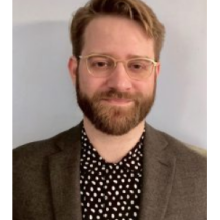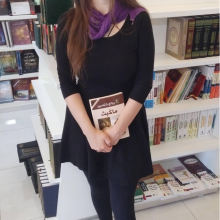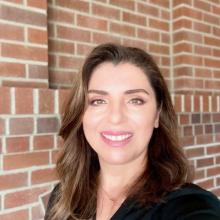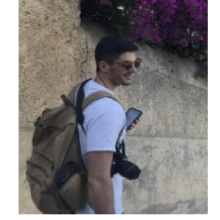By Kathryn Medill
We are grateful for those who have joined our faculty this year, and excited for the expertise that they bring to the table.
Hunter Bandy, teaching a variety of courses in Arabic & Islamic Studies
I completed my PhD in Islamic studies at Duke and previously taught at North Carolina State, Elon, and the University of Oklahoma. Last year, I was a research fellow at the EPHE in Paris. At UW, I teach classical Arabic (ARAB 412), Arabic mystical and theological literature (ARAB 410), survey courses on the Qur’an (MELC 231), and more. In Spring 2024, look for MELC 229, “Introduction to Islamic Cultures and Thought,” and MELC 590, a seminar in Middle Eastern culture and thought focused on Islam in the Early Modern period.
I research the manuscript heritage of transnational Shiʿi and Sufi Muslim networks, linking sites in Iran and Arabia to South Asia, 1300-1700 CE. My book in preparation demonstrates how these networks fashioned imperial and sultanate courts into centers of scientific power by tracing the career of a Muslim naturalist whom I consider to be an agent of mobile sovereignty. Ultimately, my book unites my interests in the history of science, political theology, and diaspora studies while contributing to a growing literature seeking to eliminate blinkered divisions between Middle Eastern and Indian Ocean Islam.
Mindy Cohoon, teaching MELC 485, “Digital Media: Middle East and Central Eurasia” (Spring 2024)
I am a PhD candidate in Near and Middle Eastern Studies focusing on human rights to internet access and on video gamers in the Islamic Republic of Iran. I have worked on a few digital projects of my own and others’, enriching my understanding of the video game industry in Iran and of literature in and beyond the Middle East. In doing so, I have learned about the significance of entanglements between creativity, historical knowledge, and ethnography. I am therefore excited to teach MELC 485 in Spring 2024. This course explores the socio-cultural relevance and use of social media and video games in the Arab world, Iran, and Turkey. I aim to teach what the Digital Middle East is, and to guide students through this hands-on and project-based course with attention to imaging, new media, electronic text, metadata and accessibility, rights management, and other issues central to contemporary humanities research on the Middle East.
Shabnam Entezar, teaching PRSAN 102, 103, 202, 203 (Winter and Spring 2024)
Greetings, I am delighted to introduce myself as a new faculty member in the MELC department, specializing in teaching Elementary and Intermediate Persian. My diverse background encompasses linguistics, curriculum development, instructional design, project management, architecture, and design. Fluent in Persian, Azeri, and possessing working proficiency in Turkish, I bring a multilingual perspective to the classroom.
Currently enrolled in the Master of Information Management program (MSIM) at UW iSchool, I am committed to advancing my academic journey with a future Ph.D. degree. My passion lies in teaching language, art, curriculum development, instructional design, as well as leadership and management. Eager to contribute to a variety of classes at the University of Washington that align with my expertise, I am grateful for the warm welcome and look forward to engaging with the university's academic community.
Jamal Gabobe, teaching MELC 288, “Introduction to the Horn of Africa” (Spring 2024)
Jamal Gabobe has a Ph.D in Comparative Literature from the University of Washington. He has wide-ranging teaching and consulting experience at the University of Washington’s Teaching and Learning Center, and with the One City Project; and as a Senior Examiner with the International Baccalaureate. He took part in the Jackstraw Writers Program and served on the editorial board for the peer-reviewed ACCESS: Interdisciplinary Journal of Student Research and Scholarship. He is a poet and a multi-lingual author who writes in English, Arabic, and Somali.
Alec Iacobucci, teaching MELC 313, “Ancient Technologies of the Middle East” (Spring 2024)
Alec Iacobucci is a doctoral student in the UW Department of Anthropology. He is interested in landscape archaeology and ceramics analysis. Alec has assisted in teaching many archaeology classes, including “Principles of Archaeology,” “Exploring Graffiti,” and “Introduction to Ancient Egyptian Archaeology.”
Corinna Nichols, teaching MELC 311, “The Archaeology of Biblical Israel” (Winter 2024)
Corinna Nichols is a Ph.D. candidate in the Near and Middle Eastern Studies Interdisciplinary Program. Her field of study is the Hebrew Bible and ancient Middle East. Corinna worked for twenty-five years in the tech field, including roles at IBM, Lenovo, and Amazon, before falling in love with ancient Israel. She has a B.A. in Latin from Wellesley College, a B.S. in Computer Science from American Sentinel University, and an M.A. in Near Eastern Languages and Civilization from UW. She is the coauthor of two published papers on the Hebrew Bible. She has served as TA for eight UW courses, as well as having taught numerous professional classes. Her dissertation is tentatively titled Entangled: Identity, Control, and Depictions of Hair in the Ancient Near East.





